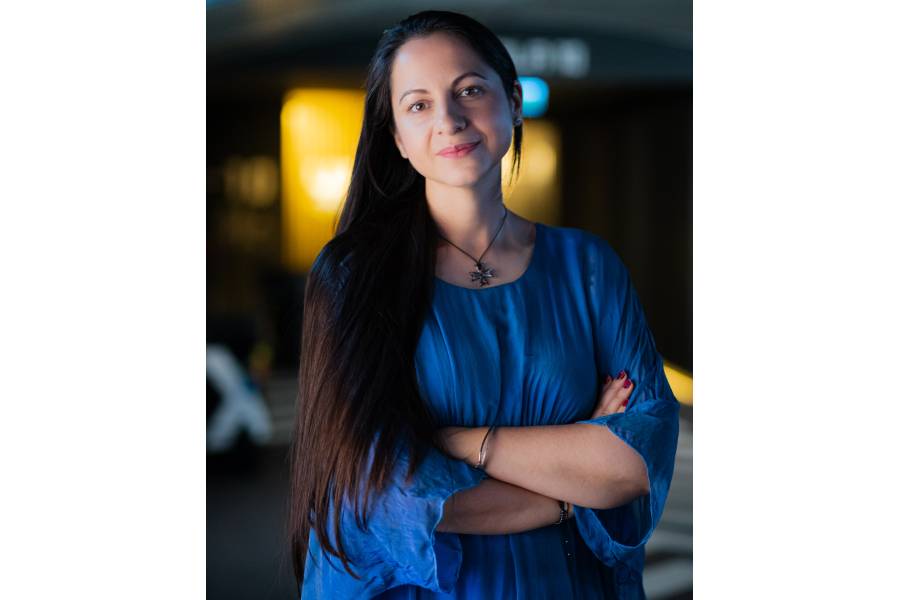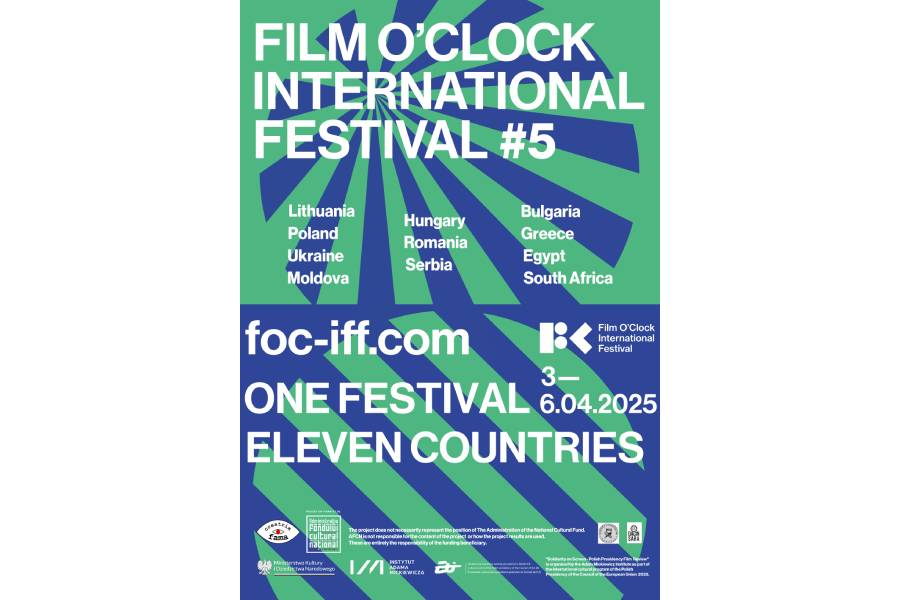Film O’Clock International Festival 2025 is welcoming cinephiles from 11 countries (Romania, Lithuania, Ukraine, Moldova, Bulgaria, Greece, Egypt, South Africa, Serbia, Hungary and Poland) with an International Short Film Competition and a Cinema Classic Section, as well as an exciting sidebar programme including an online Masterclass for Educators on Teaching Film to Children, conceived for educators from the participating countries.
Poland) with an International Short Film Competition and a Cinema Classic Section, as well as an exciting sidebar programme including an online Masterclass for Educators on Teaching Film to Children, conceived for educators from the participating countries.
Film O’Clock International Festival #5 is a cultural project produced by Creatrix Fama and co-financed by Romania’s Administration of The National Cultural Fund (AFCN)*. The fifth edition is organised under the aegis of the “Solidarity on Screen – Polish Presidency Film Review,” with the support of the Adam Mickiewicz Institute, as part of the 2025 Polish Presidency of the Council of the European Union’s cultural programme.
The partners of the event include Romanian Filmmakers Union (UCIN), National University of Theatre and Film “I.L. Caragiale” Bucharest (UNATC, National Academy of Theatre and Film (NATFA, Bulgaria), Vilnius Academy of Arts (Lithuania), Wytwórnia Filmów Dokumentalnychi Fabularnych (WFDiF), Filmoteka Narodowa – Instytut Audiowizualny (FINA), Romanian National Film Archive, Lithuanian Film Centre, CNC Moldova, Tisza Mozi, Zhovten Cinema, Asociația Româno-Elenă Artă și Cultură, Otvoreni Univerzitet Subotica Doo (Serbia), Polish Institute Bucharest, Nelsiee Cinema (South Africa).
FNE: How did you come up with the idea of the festival and how did you choose the participating countries? Isn’t it difficult to manage 11 countries at the same time?
Mirona Radu: In 2015, during a residency in China, I made a short documentary film. One day, I discovered a DVD with a Romanian film in a bookstore. I was extremely happy, it was an unexpected surprise, but also a comforting feeling to find something familiar in such a distant place, where I already felt overwhelmed. Then I wondered why so few Romanian films end up in distant corners of the world. I told myself that I would like to take Romanian film further, to make it more visible, especially since I already had experience in film distribution.
In parallel, I worked at several festivals in Romania and learned a lot from their organisers. In 2019, I was selected for a film curation and distribution programme at the Berlin Film Academy (DFFB), and the theme of my final work was to create a festival that would connect (apparently) very different countries and people, and strengthen global cinephilia. This idea came to life in 2021, in a perfect context: the COVID pandemic, when travel and physical meetings were limited.
Thus, the first edition of Film O’Clock took place simultaneously in five countries: Romania, Lithuania, Greece, Egypt and South Africa, united by the same time zone. I chose the countries by analysing the map and noting which of them share the same hour at the end of February – beginning of March. The choice was also influenced by two aspects: on the one hand, I wanted to explore cinemas that were less known to me, and on the other hand, I was looking for reliable, passionate collaborators who could co-organise the event at a local level.
With each edition, I added a new country. And this year, because we are celebrating our fifth anniversary, we decided to expand into a new time zone, including Poland, Serbia and Hungary.
FNE: What are the highlights and news of the edition?
Mirona Radu: This year’s edition comes with several pieces of news. First of all, we managed to transform one of our heritage-focused conferences into an academic conference (in partnership with UNATC, Bucharest) and bring it closer to a theme I believe in very much: the power of film to heal. I think it’s a plus if a film festival also develops the research side, and brings together professionals who explore this art form and its impact on society. This year’s academic conference addresses the relationship between cinema, memory and the healing process, bringing together researchers and filmmakers who analyse how film can contribute to emotional health and the preservation of cultural heritage. The five-year anniversary edition is therefore one of consolidation, but also of innovation.
On the other hand, we have a focus on Poland and its filmmakers, and we started this edition with a warm-up action, namely the launch in Romanian of the Celluloid Solidarity podcast, created by the Adam Mickiewicz Institute, as part of the international cultural programme of the Polish Presidency of the Council of the European Union 2025, to which we invited three contemporary Polish filmmakers to discuss solidarity, Polish film and what the act of creation entails. The Celluloid Solidarity podcast brings a new dimension to our dialogue about cultural solidarity, and I really hope that it will be listened to by as many people as possible, professionals or film lovers, as we have access to the inner world of five contemporary Polish directors, who generously share their knowledge and experiences.
FNE: We can’t help but ask you about the masterclass on children’s film education. Please give us more details about it.
Mirona Radu: In 2023, we started a partnership with the Mediterranean Documentary Festival Samos, where we present Egyptian documentaries. Last year, my heart was set on a documentary made in 1983 by Sissy Vafea, who dedicated her life to pedagogy and teaching film to children, especially disadvantaged children. It is a gem of a documentary, which highlights the power of film to highlight the deepest emotions and life lessons, and this theme has become very close to my heart. In this context, I wanted to expand our collaboration with a focus on film education for children, and to bring to the forefront the importance of this field in the formation of the new generation of cinephiles and people aware of the world around them.
The masterclass on children's cinematic education is an extremely important, major event of the edition, intended for educators and all those interested in shaping young minds through the power of film. Participants will learn about the importance of cinema as an educational tool, about how films, but especially filmmaking by children, can help them better understand the  various realities of the world, develop empathy and express their own feelings and thoughts.
various realities of the world, develop empathy and express their own feelings and thoughts.
FNE: Why do you think it is important to organise a festival that shows the best of cinema in the area, and what are its effects on coproductions?
Mirona Radu: First of all, I think it is important to organise such a festival to highlight the best films from our area, which deserve to be seen and appreciated. After all, this was my dream. To take Romanian cinema as far as possible to foreign lands. Festivals of this type are essential for increasing the visibility of local cinemas and connecting them with international audiences.
Although I am not entirely convinced of the direct effects on coproductions, I have noticed that this festival contributes significantly to increasing interest and trust between filmmakers from different countries, which can facilitate future collaborations. At the same time, its impact is felt on the participants (filmmakers, audiences and industry professionals), who are enriched with new perspectives, ideas and networking opportunities, being more open to intercultural collaborations.
FNE: Where would you like to expand the festival in future editions?
Mirona Radu: I would really like the festival to include a competition dedicated to contemporary feature films in future editions. I believe that this would add a new dimension to the event, and the audience would certainly be much more receptive and appreciate the opportunity to talk directly with contemporary filmmakers. At the same time, it would bring greater artistic diversity and stimulate a much deeper intercultural dialogue. Of course, to be able to achieve this, much larger funding would be needed, and attracting it will be a challenge, but we are extremely grateful for AFCN's co-financing this year and for the continued support that allows us to take the festival to another level.
Sponsored Statement



















